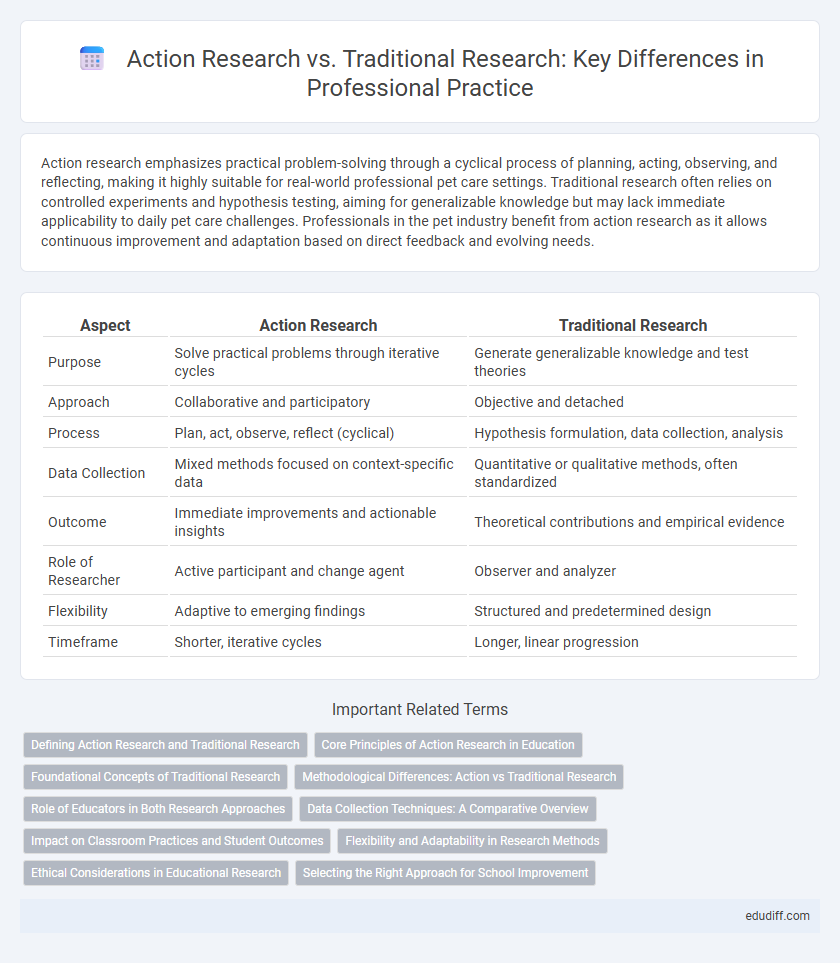Action research emphasizes practical problem-solving through a cyclical process of planning, acting, observing, and reflecting, making it highly suitable for real-world professional pet care settings. Traditional research often relies on controlled experiments and hypothesis testing, aiming for generalizable knowledge but may lack immediate applicability to daily pet care challenges. Professionals in the pet industry benefit from action research as it allows continuous improvement and adaptation based on direct feedback and evolving needs.
Table of Comparison
| Aspect | Action Research | Traditional Research |
|---|---|---|
| Purpose | Solve practical problems through iterative cycles | Generate generalizable knowledge and test theories |
| Approach | Collaborative and participatory | Objective and detached |
| Process | Plan, act, observe, reflect (cyclical) | Hypothesis formulation, data collection, analysis |
| Data Collection | Mixed methods focused on context-specific data | Quantitative or qualitative methods, often standardized |
| Outcome | Immediate improvements and actionable insights | Theoretical contributions and empirical evidence |
| Role of Researcher | Active participant and change agent | Observer and analyzer |
| Flexibility | Adaptive to emerging findings | Structured and predetermined design |
| Timeframe | Shorter, iterative cycles | Longer, linear progression |
Defining Action Research and Traditional Research
Action Research is a participatory, iterative method that combines practical problem-solving with systematic inquiry, aimed at improving practices within real-world contexts by involving stakeholders directly. Traditional Research typically follows a structured, hypothesis-driven approach focused on generating generalizable knowledge through controlled experiments or observational studies. While Action Research emphasizes collaboration and immediate application, Traditional Research prioritizes objectivity and theoretical contributions.
Core Principles of Action Research in Education
Action Research in education centers on iterative cycles of planning, acting, observing, and reflecting to improve teaching practices and student learning outcomes. This participatory approach actively involves educators in identifying problems, implementing interventions, and analyzing results within their own classrooms. Emphasizing collaboration, context-specific solutions, and continuous improvement distinguishes Action Research from traditional research methods focused on hypothesis testing and generalizable findings.
Foundational Concepts of Traditional Research
Traditional research is grounded in structured methodologies emphasizing hypothesis testing, controlled variables, and reproducibility to ensure objective and generalizable results. It relies heavily on quantitative data collection and statistical analysis to validate theories within well-defined frameworks. Foundational concepts include a clear research problem, systematic data gathering, and rigorous evaluation to maintain scientific integrity and reliability.
Methodological Differences: Action vs Traditional Research
Action research employs iterative cycles of planning, acting, observing, and reflecting to address practical problems, emphasizing collaboration and immediate application of findings. Traditional research follows a linear, hypothesis-driven approach with controlled conditions, prioritizing objective data collection and theoretical generalization. The methodological focus in action research centers on participatory problem-solving, while traditional research emphasizes systematic, controlled experimentation.
Role of Educators in Both Research Approaches
Educators in action research actively participate as both researchers and practitioners, directly influencing their teaching practice and student outcomes through iterative cycles of inquiry and reflection. In traditional research, educators primarily serve as subjects or implementers of externally designed studies, contributing data rather than shaping the research process. This participatory role in action research promotes immediate application of findings, enhancing educational strategies and professional development.
Data Collection Techniques: A Comparative Overview
Action Research emphasizes iterative data collection techniques such as participant observation, reflective journals, and real-time feedback, fostering adaptive learning and immediate application of findings. Traditional Research relies heavily on structured data collection methods like surveys, standardized interviews, and controlled experiments, ensuring consistency and replicability. Both approaches prioritize data validity but differ significantly in engagement level and flexibility during the data gathering process.
Impact on Classroom Practices and Student Outcomes
Action research directly engages educators in iterative problem-solving, fostering immediate improvements in classroom practices and enhancing student outcomes through context-specific strategies. Traditional research often emphasizes generalizable findings but may lack the practical applicability needed for swift classroom implementation. The collaborative and reflective nature of action research leads to more responsive teaching methods, positively influencing student engagement and academic achievement.
Flexibility and Adaptability in Research Methods
Action research emphasizes flexibility and adaptability by allowing iterative cycles of planning, acting, observing, and reflecting, which enables researchers to respond dynamically to emerging challenges and context-specific needs. Traditional research often follows a rigid, linear methodology with predetermined protocols that limit adjustments during the study. The adaptive nature of action research enhances relevance and practical impact in real-world settings compared to the standardized approaches typical of traditional research.
Ethical Considerations in Educational Research
Ethical considerations in action research emphasize collaboration, participant empowerment, and ongoing consent, ensuring the research benefits the educational community directly. Traditional research prioritizes strict adherence to institutional review board (IRB) protocols, confidentiality, and minimizing harm, focusing on objectivity and generalized knowledge. Balancing these ethical frameworks requires researchers to navigate participant involvement and data integrity while maintaining transparency and respect for all stakeholders.
Selecting the Right Approach for School Improvement
Selecting the right research approach for school improvement involves evaluating the goals and context of the educational setting. Action Research emphasizes collaborative problem-solving and immediate application of findings within the school environment, fostering continuous improvement through iterative cycles. Traditional Research prioritizes systematic data collection and analysis to generate generalizable knowledge, suitable for addressing broader educational theories and policies.
Action Research vs Traditional Research Infographic

 edudiff.com
edudiff.com